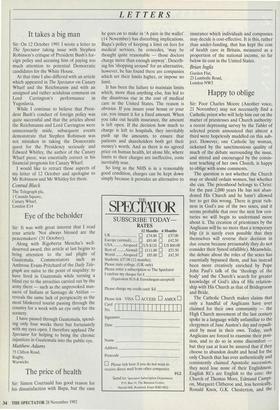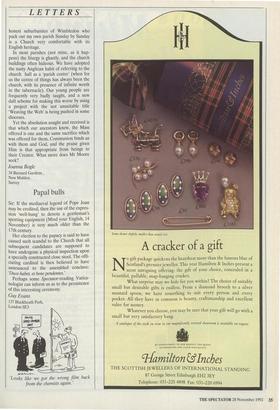Happy to oblige
Sir: Poor Charles Moore (Another voice, 21 November) may not necessarily find a Catholic priest who will help him out on the matter of priestesses and Church authority: a recent depressing survey by the Tablet of selected priests announced that almost a third were hopelessly muddled on this sub- ject. However, one Catholic lay woman, sickened by the sanctimonious quality of much of the debate surrounding the issue, and stirred and encouraged by the consis- tent teaching of her own Church, is happy to oblige with some comments.
The question is not whether the Church may or should ordain women, but whether she can. The priesthood belongs to Christ: for the past 2,000 years He has not aban- doned His Church and he hasn't allowed her to get this wrong. There is great rich- ness in God's use of the two sexes, and it seems probable that over the next few cen- turies we will begin to understand more about it. The creation of priestesses by the Anglicans will be no more than a temporary blip (it is surely even possible that they themselves will reverse their decision in due course because presumably they do not consider their Synod infallible). Meanwhile, the debate about the roles of the sexes has essentially bypassed them, and has instead been more creatively enriched by Pope John Paul's talk of the 'theology of the body' and the Church's search for greater knowledge of God's idea of His relation- ship with His Church as that of Bridegroom and Bride.
The Catholic Church makes claims that only a handful of Anglicans have ever claimed for their own community — the High Church movement of the last century spoke in a language wildly unfamiliar to the clergymen of Jane Austen's day and repudi- ated by most in their own. Today, such Anglicans are forced to examine their posi- tion, and to do so in some discomfort but they can at least be assured that if they choose to abandon doubt and head for the only Church that has ever authentically and consistently claimed Apostolic succession, they need lose none of their Englishness. English RCs are English to the core: the Church of Thomas More, Edmund Campi- on, Margaret Clitheroe and, less heroically, Ronald Knox, G.K. Chesterton, and the honest suburbanites of Wimbledon who pack out my own parish Sunday by Sunday is a Church very comfortable with its English heritage.
In most parishes (not mine, as it hap- pens) the liturgy is ghastly, and the church buildings often hideous. We have adopted the nasty Anglican habit of referring to the church hall as a 'parish centre' (when for us the centre of things has always been the church, with its presence of infinite worth in the tabernacle). Our young people are frequently very badly taught, and a new daft scheme for making this worse by using a project with the not unsuitable title `Weaving the Web' is being pushed in some dioceses.
Yet the absolution sought and received is that which our ancestors knew, the Mass offered is one and the same sacrifice which was offered for them, Communion binds us with them and God, and the praise given Him is that appropriate from beings to their Creator. What more does Mr Moore seek?
Joanna Bogle
34 Barnard Gardens , New Malden, Surrey











































































 Previous page
Previous page